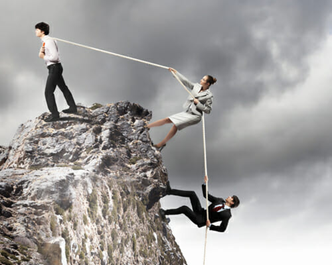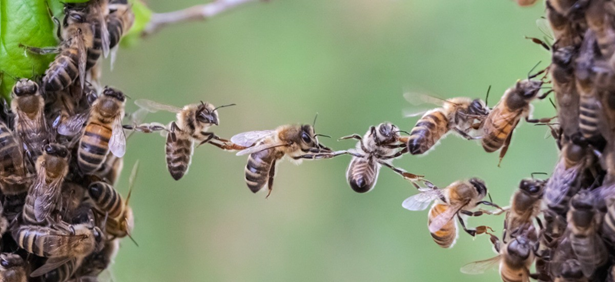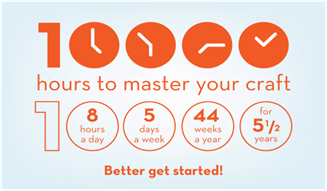
Team of experts or team experts? Peak performance!
A text from a few years ago, @Karl Ericsson’s Peak, returned to my hands. Ericsson tells the story of great performers, real experts and masters in their field, and how they were able to develop their ‘absolute’ competence in a field. Contrary to the common belief that ‘expert performance’, as he calls it, is linked to innate abilities and skills, his research and his book indicate that the status of champion is achieved mainly through the ability to learn complex knowledge and with physiological adaptations that are acquired over time. The author distinguishes between an ineffective practice and one that is effective: in this regard he starts as a ‘deliberate practice’ in the sense of a motivated and planned exercise.
The steps that can lead us to peak performance, in addition to the firm will to get there, are three:
- The search for a model of expert who has reached at least the reference level; the fascination that this mastery exerts will push you to explore the ways, styles and motivations that have brought it this far.
- Once the model has been set, it is time to look for someone to help us hurry and give us a method in learning. You need a teacher who is suitable for your age and experience, and you need to have set a target level that takes us outside the comfort zone and stimulates us to face learning in an always different way, without jamming.
- Finally, as you progress, you need the sensitivity to change the teacher when your level rises.
In short, as you can see: excellence alone is difficult to achieve. We need a deliberate plan, the right help and a lot of effort. To put it in Ericsson’s words, “The reason most people don’t display the extraordinary abilities to excel is not because they don’t have them, but rather because they are satisfied with living in their comfort zone and don’t want to put in the effort that is needed. to get out. They are satisfied with the world of ‘that’s okay’ “. Without going beyond your comfort zone, you cannot improve, the researcher tells us.
Last note: Ericsson insists on the concept of representing mentally and as clearly as possible both how you will feel and what you will do once the goal is reached, and, above all, fix and visualize in your mind everything you are learning and being doing to develop the excellent performance. This action contributes to the reinforcement of the new neural circuits that learning builds: do you remember the triune brain and the neurology of learning? In this way, learning becomes training and is more powerful than the simple accumulation of knowledge.
A touch of color, starting from these basics, Malcom Gladwell writes Outliers, and launches the famous 10000 hours rule: the minimum time it takes to become a champion in any matter (it is valid only if you put it together with the three points we have seen before ).
But why this digression on excellence if, with Paolo Chinetti, we dealt with team and teamwork in The right team, you say?
Because there is a particular type of team, one made up of experts (and perhaps integrating multiple disciplines), which deserves an in-depth exploration. A team of experts is not necessarily collectively experienced in teamwork; on the contrary, the great specialized competence can cause conflicts and disagreements that reduce the team’s performance.
Research in this field started in the military and medical fields, and then extended to engineering and sport. Tiffany Bisbey, Allison Traylor and Eduardo Salas explain to us, in a beautiful article in the Journal of Expertise, that, just as the individual’s expertise is not innate, the team’s experience is also not. Teams must engage and focus to combine and integrate their skills, to develop further learning by working together and to create the conditions that support quick and accurate decision making.
In particular, the researchers identify eight distinctive areas of action to develop teamwork between experts and start talking about an expert team (vs team of experts …):
- The experienced team must develop shared mental models. It is about the perception of how the task should be faced, with which strategies and skills and how to interact between experts. This is not a trivial activity, when the team goes under stress the shared mental models tend to weaken and everyone goes their own way. It is for this reason that the practice of team reflexivity becomes useful: moments of comparison and discussion of objectives, strategies and operational processes are institutionalized. Equally fundamental tools are the pre- and de-briefings, in which the point is made on processes and successes.
- The experienced team is able to learn and adapt even in unexpected situational contexts. In teamwork, skills and knowledge are built in many ways: working together, training individually or collectively, tackling critical tasks. In all cases, Ericsson’s indication is ‘followed’: do to learn, and do with a plan. Let’s say that the team of experts is able to develop situational awareness and to treasure it, adaptation and learning are not approached by chance at this point!
- An experienced team defines clear roles and precise responsibilities. This is a precondition for developing the team’s transactional memory, i.e. making the team’s expertise resources immediately available. Roles and responsibilities evolve as the collective competence map is completed. Proper training can reinforce these processes.
- An experienced team is motivated by a shared vision.
- An experienced team develops effective and dynamic leadership. Let us remember the concept of team as an ecosystem and of leadership (also widespread) as an emerging / emerging characteristic in response (and in anticipation) to the context.
- An experienced team is positive and develops a climate of psychological safety. Specialist expertise helps in this sense: experts are instinctively more confident and ‘recognize’ each other.
- Consequently, an experienced team collaborates and coordinates. Collaboration and coordination give the experts in the team a real performance boost.
- An experienced team is resilient. Again, this stems from an expert’s natural ability to study and cope with difficulties with competence.
How can these collective competences be developed? (a) With training (in The Right Team we dedicate a section to the different types of training), (b) with simulation and the exchange of roles, (c) with team coaching and (d) with debriefing.
But how can the team aim for peak performance as well as an individual (the three steps we talked about at the beginning)? It is not easy to transfer Ericsson’s ‘recipe’ to the team, and the three researchers suggest that the ‘deliberate practice’ be concentrated on two domains in particular.
- Feedback, learning and adaptability. An experienced team of experts is able to collect feedback effectively, learn accordingly and adapt their action at any time. Eye: when we talk about adaptation we mean the ability to develop one’s skills and knowledge in a certain direction. And keep an eye out: the trigger for this adaptation is feedback, and therefore the ability to grasp it by listening and observing the consequences of the action of one’s team on the field. Hence the importance of debriefing, and also of role playing and simulation that allow you to convey or capture feedback in a ‘soft’ way.
- Specific knowledge of the sector and memory as a working tool. Experts, as a consequence of their particular knowledge, develop the ability to intuit in advance the effect of external stresses on their action. They also have a much more developed working memory than the average of other people. In short, to quote Camilleri, they are ‘partial brains’. Thanks to these two skills, experts continue to apply what they learn in different contexts and increasingly refine their skills. So, to pool these skills and become an experienced team, you need to focus on mapping these skills (transactive memory) and making them available as they are needed (situational awareness).
When I spoke to you about deliberate practice, referring to individual peak performance, I meant an individual characteristic, based on motivation and vision. In the case of the team, Salas and the other authors encourage us to think of a ‘guided’ practice by the collective of the team, to meet the needs of the task and the objectives of the team itself. In guided practice, the leadership or a coach guide the team to read the feedback towards the necessary learning and adaptation.
Finally, there is another feature that makes expert teams so projected towards being expert teams: the passion for their own expertise. I see it and experience it every day in engineering teams: solving a problem, completing a task represents the greatest stimulus for the team towards the next challenge!





